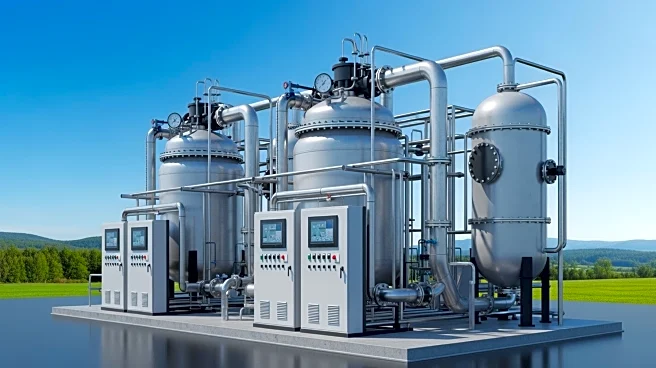What's Happening?
The biogas industry is experiencing significant growth, driven by technological advancements and increased demand for renewable energy solutions. Biogas, a renewable energy form generated through anaerobic
fermentation of organic matter, is gaining traction as an alternative to natural gas. The global biogas market reached a value of USD 74.37 billion in 2024 and is projected to grow to USD 106.03 billion by 2033, with a CAGR of 3.82% from 2025 to 2033. This growth is fueled by environmental, economic, and policy motivations favoring renewable energy usage and green waste management. Technological improvements in biogas upgrading to biomethane have broadened its application for transportation and integration into gas grids, enhancing its commercial viability.
Why It's Important?
The expansion of the biogas industry is crucial for addressing climate change and reducing greenhouse gas emissions. Biogas provides a carbon-free alternative to fossil fuels, supporting national and corporate net-zero ambitions. Encouraging government policies, such as subsidies and renewable energy obligations, are driving investment in biogas facilities. The emphasis on circular economy processes further drives the market, as biogas facilities transform organic waste into valuable energy and nutrient-rich digestate for farming. In developing countries, biogas offers a cost-effective means of rural electrification and cooking, reducing dependence on wood and fossil fuels. The industry's growth presents significant investment opportunities and contributes to energy security amid global energy crises.
What's Next?
The biogas industry is poised for further expansion as nations continue to adopt green waste management solutions. Technological advancements in biogas upgrading and purification will enhance its application in transportation and integration into gas grids. The industry's growth will likely attract more investment, driven by government policies and the increasing demand for clean energy solutions. As the world becomes more concerned about climate change, biogas will play a key role in meeting sustainable development goals and reducing fossil fuel dependency.
Beyond the Headlines
The biogas industry's growth has deeper implications for global energy security and environmental sustainability. By transforming waste into energy, biogas supports a circular economy and reduces landfill waste. The industry's expansion also highlights the importance of decentralized energy systems, which can provide reliable power in rural areas and reduce reliance on centralized fossil fuel-based energy sources. As biogas facilities become more widespread, they will contribute to a cleaner environment and promote sustainable agricultural practices through the use of digestate as organic fertilizer.










